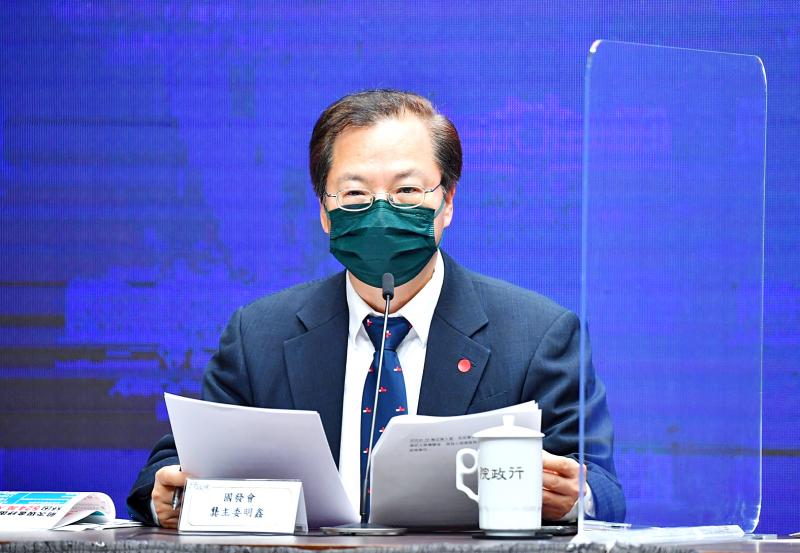The government is planning measures to support local start-ups after a rise in COVID-19 infections in Taiwan, National Development Council Minister Kung Ming-hsin (龔明鑫) said after attending a videoconference with several industry representatives on Friday.
Local start-ups face more difficulties when applying for relief funds or subsidies, as well as when securing credit lines from banks, because they are generally smaller, have not yet started to generate revenue, or their business models or operational schemes do not qualify for relief funds based on current policies, the council said.
SERIOUSLY AFFECTED

Photo courtesy of the Executive Yuan
As a result, start-ups tend to be more seriously affected by the pandemic than other businesses, the council said.
To help start-ups overcome the difficulties, the government is planning to provide more relief funds to struggling start-ups, allow for a more flexible interpretation of financial subsidies for such firms and help start-ups in their investments, the council said.
The council said it held discussions with the management committee of the Executive Yuan’s National Development Fund, the Ministry of Economic Affairs, and representatives from small and medium-sized enterprises to make more start-ups eligible for relief funds, offer them high credit guarantees and provide them with higher loan amounts or more favorable interest rates.
Considering local start-ups’ urgent need for funds, the government would also simplify follow-up administrative procedures for such firms, the council said.
FLEXIBILITY
As the business scope of some start-ups covers multiple industries, which has made it difficult to categorize and qualify them for relief funds, Kung said he has negotiated with the economics ministry and related government agencies to handle start-ups that have been negatively affected by the pandemic in a more flexible manner.
Early last year, when COVID-19 was starting to take hold worldwide, the council presented a special investment option to help local start-ups, offering six to 12 months of funding in exchange for preferred stocks in the firms.
The council would consider whether to continue the investment scheme this year to reduce the financial pressure on local start-ups, Kung said.
The measures are subject to approval by the fund, which is expected to discuss them at a meeting tomorrow.
The videoconference was attended by Taiwan Venture Capital Association chairman Andy Chiu (邱德成), Digital Economy Association Taiwan chairman Jeffrey Wu (吳昕霈), Asia America Multi-Technology Association chief executive officer Jasmine Lin (林蓓茹) and Taiwan Association for Virtual and Augmented Reality chairman Andy Peng (彭子威), as well as the economics ministry’s Department of Commerce Deputy Director-General Chen Mi-shun (陳秘順), among others.
Additional reporting by staff writer

Hon Hai Precision Industry Co (鴻海精密) is reportedly making another pass at Nissan Motor Co, as the Japanese automaker's tie-up with Honda Motor Co falls apart. Nissan shares rose as much as 6 percent after Taiwan’s Central News Agency reported that Hon Hai chairman Young Liu (劉揚偉) instructed former Nissan executive Jun Seki to connect with French carmaker Renault SA, which holds about 36 percent of Nissan’s stock. Hon Hai, the Taiwanese iPhone-maker also known as Foxconn Technology Group (富士康科技集團), was exploring an investment or buyout of Nissan last year, but backed off in December after the Japanese carmaker penned a deal

SUPPORT: The government said it would help firms deal with supply disruptions, after Trump signed orders imposing tariffs of 25 percent on imports from Canada and Mexico The government pledged to help companies with operations in Mexico, such as iPhone assembler Hon Hai Precision Industry Co (鴻海精密), also known as Foxconn Technology Group (富士康科技集團), shift production lines and investment if needed to deal with higher US tariffs. The Ministry of Economic Affairs yesterday announced measures to help local firms cope with the US tariff increases on Canada, Mexico, China and other potential areas. The ministry said that it would establish an investment and trade service center in the US to help Taiwanese firms assess the investment environment in different US states, plan supply chain relocation strategies and

WASHINGTON POLICY: Tariffs of 10 percent or more and other new costs are tipped to hit shipments of small parcels, cutting export growth by 1.3 percentage points The decision by US President Donald Trump to ban Chinese companies from using a US tariff loophole would hit tens of billions of dollars of trade and reduce China’s economic growth this year, according to new estimates by economists at Nomura Holdings Inc. According to Nomura’s estimates, last year companies such as Shein (希音) and PDD Holdings Inc’s (拼多多控股) Temu shipped US$46 billion of small parcels to the US to take advantage of the rule that allows items with a declared value under US$800 to enter the US tariff-free. Tariffs of 10 percent or more and other new costs would slash such

Three experts in the high technology industry have said that US President Donald Trump’s pledge to impose higher tariffs on Taiwanese semiconductors is part of an effort to force Taiwan Semiconductor Manufacturing Co (TSMC, 台積電) to the negotiating table. In a speech to Republicans on Jan. 27, Trump said he intends to impose tariffs on Taiwan to bring chip production to the US. “The incentive is going to be they’re not going to want to pay a 25, 50 or even a 100 percent tax,” he said. Darson Chiu (邱達生), an economics professor at Taichung-based Tunghai University and director-general of